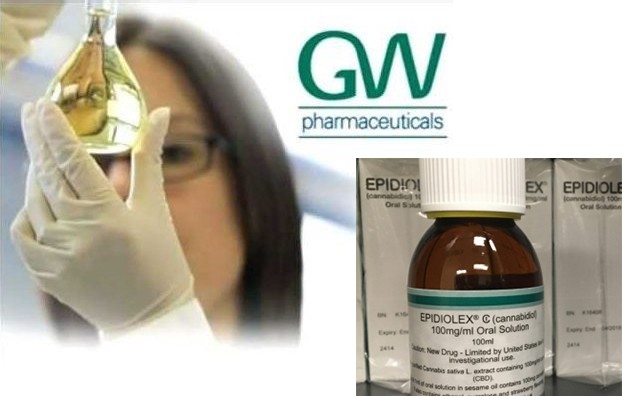LONDON – UK-based pharmaceutical company GW Pharmaceuticals on Monday announced that cannabis-based drug Epidiolex has received approval from the U.S. Food and Drug Administration. Developed to treat seizures associated with Lennox-Gastaut syndrome (LGS) or Dravet syndrome, Epidiolex is the first cannabis-based medication approved by the FDA.
“Today’s approval of Epidiolex is a historic milestone, offering patients and their families the first and only FDA-approved CBD medicine to treat two severe, childhood-onset epilepsies,” Justin Gover, GW’s Chief Executive Officer said in a statement. “This approval is the culmination of GW’s many years of partnership with patients, their families, and physicians in the epilepsy community to develop a much needed, novel medicine. These patients deserve and will soon have access to a cannabinoid medicine that has been thoroughly studied in clinical trials, manufactured to assure quality and consistency, and available by prescription under a physician’s care.”
Presumably, conventional doctors will be able to prescribe the new medication without requiring patients to access certification required for forms of medicinal cannabis oil that are unapproved but are distributed by dispensaries in states where medical cannabis is legal.
However, federal prohibition of cannabis-related products, as well as state and local regulations may present a hurdle for prescribers, especially in states that have not implemented medical cannabis policies or legalization. Epidiolex is a purified form of cannabis-derived cannabidiol (CBD) oil that contains no tetrahydrocannabinol (THC), which is the psychoactive compound in cannabis and is derived from hemp.
When contacted for comments GW Pharmaceuticals did not respond.
LGS and Dravet syndrome are forms of extreme epilepsy that affect young children. Patients typically suffer from multiple seizures, have low quality of life, and shortened life expectancy.
“In my practice, I often see patients with these highly treatment-resistant epilepsies who have tried and failed existing therapies and are asking about CBD,” said Orrin Devinsky, M.D., of NYU Langone Health’s Comprehensive Epilepsy Center and a lead investigator in the Epidiolex clinical program. “I am delighted that my physician colleagues and I will now have the option of a prescription cannabidiol that has undergone the rigor of controlled trials and been approved by the FDA to treat both children and adults.”
“For those living with intractable seizures caused by LGS and Dravet syndrome, Epidiolex represents a true medical advancement,” Philip Gattone, president and CEO of the Epilepsy Foundation added to the announcement. “Clinical development for these rare and severe conditions is essential, and today’s news brings hope for these patients and their families that a new treatment option may have the potential to help better control their seizures.”
In a statement on the approval of Epidiolex, the FDA said, “This product approval demonstrates that advancing sound scientific research to investigate ingredients derived from marijuana can lead to important therapies. This new treatment provides new options for patients.
“This is an important medical advance. But it’s also important to note that this is not an approval of marijuana or all of its components. This is the approval of one specific CBD medication for a specific use. And it was based on well-controlled clinical trials evaluating the use of this compound in the treatment of a specific condition. Moreover, this is a purified form of CBD. It’s being delivered to patients in a reliable dosage form and through a reproducible route of delivery to ensure that patients derive the anticipated benefits. This is how sound medical science is advanced.
“So today, in addition to celebrating this scientific achievement and the medical advance that it represents for these patients and their families, we should also reflect on the path that made this possible. It’s a path that’s available to other product developers who want to bring forth marijuana-derived products through appropriate drug development programs.”
The FDA went on to say that it has supported research into cannabis-based medications, and continues to work with other federal agencies including the National Institute on Drug Abuse, part of the National Institutes of Health, and the Drug Enforcement Administration.
Rigorous standards and procedures, including clinical testing, is needed, they said, to pinpoint specific medical conditions to be targeted by specific formulations, as well as arriving at parameters for exact dosage for cannabis derivatives.
The lengthy FDA statement also pointed out that the agency is actively involved in providing access to experimental therapies, while clinical trials were ongoing and with special access provisions.
“Today’s approval demonstrates our commitment to the scientific process and working with product developers to bring marijuana-based products to market,” said the FDA. “We remain committed to our gold standard for product development and review. Such a process ensures that any new therapies from marijuana and its constituents are safe, effective and manufactured to a high and consistent quality. And most importantly, that these products have been proven safe and effective for patients.”
Pediatric cannabis medicine advocacy nonprofit Cannakids’ founder and chief executive officer Tracy Ryan said that she hopes FDA approval of Epidiolex will lower the barriers for other pharmaceutical grade cannabis-based drugs or force the Department of Justice to finally reschedule cannabis so medicines can be researched and developed.
“The jury is still out as to what Epidiolex being FDA approved will mean for the cannabis industry, but I am praying that it will lower barriers for research,” Ryan said. “There are clearly medical benefits to this plant, and this just goes to further prove it. How much longer can the DEA truly hold cannabis hostage under the Schedule 1 classification, which means there is no benefit at all and has a high probability to cause addiction?”
“With all the research projects [Cannakids] now have going on with both UCLA and The Technion Institute in Israel, we really need a more expeditious path to get approval so we can study cannabis in federally regulated research facilities. It is such a long and arduous process to get Schedule 1 licensing, and the longer this takes the more patients we stand to lose to serious diseases cannabis can help,” she added.
(Video courtesy CBS4 Denver/YouTube)









